B.R. Stateham's Blog, page 12
April 10, 2013
Writing Mentors
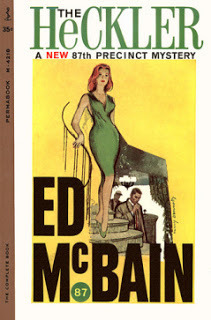 A writing mentor. Every writer needs one. You want to be a writer you first start out being an avid reader. Or . . . . you should.
A writing mentor. Every writer needs one. You want to be a writer you first start out being an avid reader. Or . . . . you should.You read hundreds of books. Thousands of books. Finish one, immediately pick up the next. There is no stopping.
But somewhere down the line the bug bites you. Or like a Grizzly in heat, mauls you. That urge to write. You get this itch under your collar; your mind gets restless. All kinds of strange plots for stories explode into your conscience and you've just GOT to sit down and hammer it out on paper or a computer screen!
That's when you know the Writing Bug has taken a chunk out of you behind. It's permanent now. There is no antidote. No divorcing it. The two of you are going to grow old together.
But the thing is this; you need a mentor . . . a favorite writer . . . to show you the first initial steps in writing whatever it is that's rolling around in our nogg'en. I sincerely doubt any writer started out absolutely fresh. Coming up with his own personal 'voice' (as MFA professors will tell you you need to find in writing classes) without first mimicking your favorite writer.
As your probably by now have guessed, I write (love) the mystery/detective genre. I'm not saying I'm good at it. Or successful at it (yet). But I am saying I love the genre and occasionally . . . occasionally . . . have written a story or two I'm particularly proud to claim as my own.
And it wouldn't have been possible without the mentoring from a writer by the name of Ed McBain .
Ed McBain, or by his other pen name (one of many) Even Hunter. . . or by his real name, Salvatore Albert Lombino . . . was a New York writer who was prolific in his writing. Using the McBain moniker he wrote detective/mystery novels. And his most accomplished success was the fabled 87th Precinct series . The 87th introduced me into the sub-genre of the detective novel called police-procedural. Writing about cops and their line of work. McBain was a master at this, introducing us to a number of hard working, mostly honest, sometimes foolish, homicide detectives out of the 87th. Each on you got to know personally. They were three-dimensional. Well rounded. They actually breathed.
But what truly made me admire this man . . . and thus want to mimic him . . . was the crisp brevity of his writing. Clean, sharp, crystal clear. Short, precise sentences which grabbed you and bodily hurtled you into the middle of the scene with vivid intensity.
If you can write like that, bambino, you're a writer. A damn good writer.
McBain . . . just for the 87th Precinct series . . . churned out something like 55 novels. God knows how many he wrote if you add in all his pen names and his real name. He averaged about two novel a year for decades so that should give you an indication he was prolific. But as Ed McBain the 87th was/is his crowning legacy.
And in my opinion, nobody writes a police-procedural better. But of the 55 books in the series, the six novels which introduces a deliciously evil genius know as The Deaf Man stands head and shoulders above everything. Talk about being diabolically evil! Wow! A complex creature who . . . in the end . . . walks away and is never caught. He's still out there somewhere plotting his next caper.
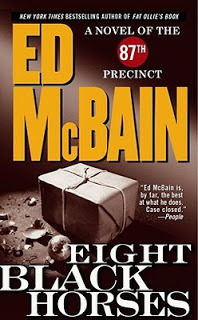 The best book in the series (always subject to change, mind you) is one called Eight Black Horses. The Deaf Man plots a very intricate game of wits to challenge and irritate the detectives of the 87th as he prepares for a spectacular robbery. Brother, the writing in this one so spectacularly brilliant! Five pages into this one and you know, just know, you are reading the words uttered from a master story teller.
The best book in the series (always subject to change, mind you) is one called Eight Black Horses. The Deaf Man plots a very intricate game of wits to challenge and irritate the detectives of the 87th as he prepares for a spectacular robbery. Brother, the writing in this one so spectacularly brilliant! Five pages into this one and you know, just know, you are reading the words uttered from a master story teller.So there you are. You're a writer. You want to be the best writer you can possibly be. Well, be one! Find the writer who moves you the most. Experiment with his style. His voice. Branch out--try some sentence structures of your own design. Throw in, or discard severely, descriptive phrases until you find something that fits your standards. (that's finding your own Voice, by the way . . . just in case you didn't pick up on that)
Voila! Master your own style and you've become a real writer!
Which means, of course, that like the rest of us you'll starve to death trying to earn a living off your writing and your name will be forgotten completely the day after they throw your coffin in the ground.
But, hey! That's Life, ain't it?
Published on April 10, 2013 10:19
April 2, 2013
The proverbial side-kick
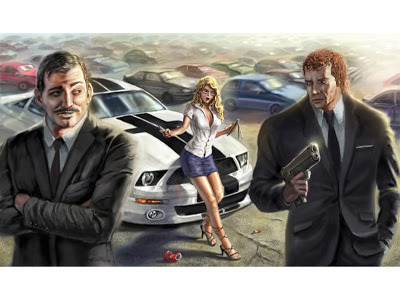 Let's talk about gumshoe side-kicks. You know, the Doctor Watson wannabes.
Let's talk about gumshoe side-kicks. You know, the Doctor Watson wannabes.I've never really liked'em. I'm thinking of creatures especially like Hercule Poirot's Captain Haskins in the early Agatha Christie novels. Or the bungling, but lovable old buffoon of a Dr. Watson played by Nigel Bruce in the Basil Rathbone Sherlock Holmes movies of the 1930's.
Clownish amateurs there to screw up the crime scene, maybe give a little humor to a story, but really present to build up the brilliant detective work and intellectual genius of the main character.
Two emotions come to mind at the same time. One is Yuck! And the other is Why?
The Yuck comes to mind because, in my opinion, the buffoonish nature of a Captain Haskins is just too distracting to the overall story. It is a physical and obvious insertion of a sounding-board . . . or automatic applause machine . . . the author slaps in to get the reader to appreciate the main character better. Unneeded and unappreciated.
The Why? comes in asking this question; "Why so buffoonish? And why so amateurish?" Can't an author create a side-kick who is smart and intelligent? One who can infuse a little humor (if its needed) into the plot without making him look like he was just released from a loony farm?
I say there is. And I have a few examples (although two of them are not the 'humorous' kind of fellas to be around).
If you've ever read Robert Crais' Elvis Cole series you run across a character by the name of Joe Pike. Ooooooh . . . . one mean SOB! Someone you wouldn't want to be on their bad side. But one hell of an ally when the chips are down. Joe Pike is no second hand caricature to be easily dismissed. He's every bit as talented and every bit as tough (maybe even tougher?) than Elvis Cole.
A second side kick that comes to mind is Hawk from Robert B. Parker's Spenser series. Big. Mean. Bald. And very loyal. So good in fact one quietly speculates on what would have happened if Hawk and Spenser became enemies. Who would come out the winner on that one? It'd be a toss up, fella. A real toss up.
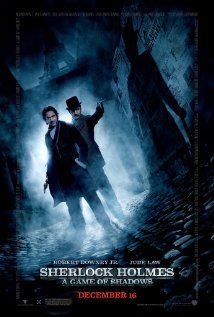 The absolute best example of a side kick I'd root for is the Robert Downing Jr. Sherlock Holmes movies featuring Jude Law as Dr. Watson. Two movies in this re-imaging of of this classic character where Dr. Watson is portrayed as being a near-intellectual equal to Holmes. But more importantly, Watson is absolutely essential to Holmes' success. Therefore he is an equal to his more famous compatriot.
The absolute best example of a side kick I'd root for is the Robert Downing Jr. Sherlock Holmes movies featuring Jude Law as Dr. Watson. Two movies in this re-imaging of of this classic character where Dr. Watson is portrayed as being a near-intellectual equal to Holmes. But more importantly, Watson is absolutely essential to Holmes' success. Therefore he is an equal to his more famous compatriot. Jude Law's portrait of Dr. Watson brings wit, sarcasm, humor, humanity and genuine friendship to play in these moves. Absolutely astonishing to watch! I could watch (and fervently hope the do!) this cinematic series forever.
I'm writing this as a blog today because of the red headed guy in the artwork at the top of the blog. The red head is Frank Morales.
The side kick to Clark Gable lookalike, Turner Hahn. Both of'em are homicide detectives and partners. And so far, in the 23 or so short stories and 3 novels I've written featuring them, both are in almost every scene together playing off each other.
But maybe it's time for Frank to spread his curmudgeon's wings and fly on his own power. He's certainly is capable of taking on cases by himself. Technically he's smarter than Turner when it comes to sheer IQ numbers. And his personality is . . . shall we say . . . a little more brutally direct than Turner's.
Together Turner and Frank make a great investigating pair. But separating Frank from Turner and giving him his own cases to solve creates some interesting possibilities. Of course the red headed SOB won't like it . . . being on his own. He's very smart and very observant. But the one thing he isn't is he doesn't play nice when he's on his own.
But not being able to do the nice-nice makes for great possibilities. Don't you think?
Published on April 02, 2013 10:04
March 28, 2013
Gloves Off is Out!
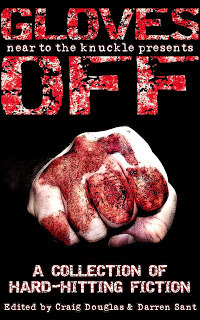 Here it is. Darren Sant and Craig Douglas'
Gloves Off
. A heaping together of nineteen of the roughest, toughest, most critter-like writers of hardboiled, noir, and horror to be assembled under one pup tent.
Here it is. Darren Sant and Craig Douglas'
Gloves Off
. A heaping together of nineteen of the roughest, toughest, most critter-like writers of hardboiled, noir, and horror to be assembled under one pup tent.And yes, I've claimed my little spot of space underneath the tiny patch of canvas along with the others. I've got a story in here entitled 'Cold.'
I've got to say that I'm very pleased to be associated with this assortment of bad asses. There is some truly genuine talent in this gathering. Talent like Richard Godwin, Graham Smith, Paul D. Brazil and Gareth Spark. To be asked to contribute something of mine was a great honor. To be even remotely ranked up there with the headliners featured in the anthology is kinda intoxicating.
Who knows? I might turn out to be a genuine writer after all.
The bloke who came up with this nifty idea, Darren Sant, has an ezine called Near To The Knuckle . Over the last two years I've hacked together some stories and bopped them electronically over to England for him to consider. Surprisingly he's accepted every one I've sent. (either a terrible case of amensia overwhelms him every time one of my stories comes up for review and he thinks I'm someone else . . . or maybe he just likes what I write. The first option makes sense. The second option would be nice too.)
Near To The Knuckle covers a wide spectrum of stories which, in one way or another, involves a bloody mess and a dead body stuffed in some one's closet somewhere. Or maybe underneath a divan. Or a street gutter. Or . . . well, you get the picture. Lots of writers show up with their unique prose and styles. From all over the world.
That's one of the two things I've grown to enjoy with the coming of the Internet. The first is this tremendously huge rebirth of writing short stories which seems to be directly attributable to the invention of the electronic age. And secondly ezines popping up everywhere willing to pull in writers from all over the world to fill their pages with stories.
It truly is a writing renaissance we're witnessing.
Go get you a copy of this anthology. You won't regret it. And then come back and tell me what you thought of my story.
(Of course it is the best in the lot! I wouldn't be a real writer if I didn't secretly believe that!)
Published on March 28, 2013 09:30
March 22, 2013
Promises unkept and other things
 If you're a writer, how long have you been writing? It struck me earlier today that I've been writing over a significant span of my life time. So I took the time to think back and remember the very first story. The year was 1960. Fifty-three years ago. Wrote in long hand in a spiral notebook a complete novel. Hard core science-fiction. Back then I was twelve years old and had just discovered the amazing worlds of Edgar Rice Burroughs. In one summer I read'em all. All the Tarzan novels. All the Barsoom (Martian) novels. All the Vesuvian novels. All of 'em.
If you're a writer, how long have you been writing? It struck me earlier today that I've been writing over a significant span of my life time. So I took the time to think back and remember the very first story. The year was 1960. Fifty-three years ago. Wrote in long hand in a spiral notebook a complete novel. Hard core science-fiction. Back then I was twelve years old and had just discovered the amazing worlds of Edgar Rice Burroughs. In one summer I read'em all. All the Tarzan novels. All the Barsoom (Martian) novels. All the Vesuvian novels. All of 'em.After Burroughs came the others. Isaac Asimov. Robert Heinlien. Arthur C. Clarke. Poul Anderson. H.G. Wells. Dozens more. Any and all science-fiction writer I could get my hands on. And the more I read the more I thought about the idea of trying my own hand at writing something.
Along the way I ran into, and fell in love with, hardboiled detective stories. Sumbitch! More stories to write! I quickly realized I'd be writing something or another for the rest of my life.
Of course the story written long hand is gone. Long forgotten and misplaced. But I've been writing continuously ever since.
What also occurred to me about this long ole' journey through my imagination is this; the promises unkempt. Fifty three years of trying to get published you contact and talk to a lot of different people. Other writers, god knows how many editors, a shit-pot load of agents. Most of them were honest enough to tell me they were not interested. In fact the vast majority of publishers and editors were quite blunt about it. Yeah, at first, blunt rejections like this kinda hurts the old ego, pilgrim. But if you're a writer you've got to expect it. Expect it and push past it. I endured and developed that thick skin of invisible armor all of us have to acquire in one fashion or another.
But the publishers and agents who were the nasty little chameleons in life. . . the ones who just loved my work and promised me the world . . . only to dump me the moment the rowing became tough for them; those are the chinks in my armor. The promises unkempt. Those are the ones that still ring my chimes and pisses me off.
Oh, well. Who the hell said that Life was going to give you a fair handshake, pat you on the back, and send your jolly self off into the sunset with a grin on your face and success in your pocket? If someone has said that, I must'uf missed the memo.
(Okay, Hermione. I'm finished bitch'n now and going back to write something.)
Published on March 22, 2013 11:46
March 4, 2013
My Five Best Westerns
 A few days back someone printed a list of his five best Westerns. It got me to thinking.
A few days back someone printed a list of his five best Westerns. It got me to thinking.As a film genre goes, the Western has fallen on bad times. Hardly see one being made these days. Which is a resoundingly foolish mistake Hollywood is committing if you ask me. The Western can't get any more American as a film type. It literately encapsulates what Americans have always thought of themselves. Rugged, independent, honest, tough as rawhide, and reliable. Interestingly that image (whether it's right or wrong is immaterial) hasn't changed in 200 years. It's what we think we are.
Every nationality has an image of themselves. And every nation's movie producers try to fill that image with visual representations for its audience.
So I'm thinking the Western should be making a BIG come back soon.
Anyway . . . . we were talking about the five best Westerns ever made. Let's continue down that murky road and see where we come to a screeching halt, shall we?
First of all, how do you make such a selection. What is the criteria you're using to make the selection? What's the time frame, for instance. The years between 1800 and 1900? Between 1700 to 1900? That is an issue. What defines the period when a Western is a true Western?
Can a Western be a comedy? Think of Mel Brook's Blazing Saddles. Is that a real Western? Or more like a Comedy dressed up in western clothing? Is a Western solely a drama? Could it be a Musical like Paint Your Wagon or Oklahoma? How about all those Gene Autry movies where they mixed horses and automobiles together in the movies made in the middle and late '30's? Hmmm . . .
Okay. Cut to the chase; my definition of a Western. Drama; depicting the American West between 1800 to 1900. Here goes;
1. The Searchers (filmed, 1956)
2. The Man Who Shot Liberty Valence (1962)
3. Magnificent Seven (1960)
4. Unforgiven (1992)
5. (tie) Stagecoach (1939) and My Darling Clementine (1946)
If you're a movie buff you've already seen this list about six or seven times apiece. And quite willing to sit down and see them all over again. They're classics. Great movie plots with genuine stories that pull you in immediately. Great scenery to behold the American West. Great photography . . . both in color and in black and white . . . that just fires up your imagination. And of course . . . great acting.
John Wayne is in three of the above movies (The Searchers, The Man Who Shot Liberty Valence and Stagecoach). Let's face it. When it came to depicting the rugged, silent type, no one beats John Wayne. He's the flawed loner . . . the honest man who, despite his flaws, knows the right thing and does it.
But I'm giving a big 'Hi Ho, Amigo!' to Yul Brynner (Magnificent Seven). There's just something about this ball headed gunslinger that grabs you. One tough SOB.
And then there's Henry Fonda. There's a basic streak of Just Plain Honesty in the man you've got to admire in this movie. Honesty and Commitment. Love this oldie. Love'em all.
Oh, by the way . . .
The photo above. Coming out of the last scene of The Searchers. Wayne brings his niece home after years of captivity with a band of Comanches. He once swore that he was going to kill for fear she had 'gone indian.' But in the end he saves her life and brings her home . . . and stands in the doorway after the family gathers around her and then turns, and walks into the sunset.
Classic American chutzpah.
Published on March 04, 2013 07:30
February 26, 2013
How do you write?
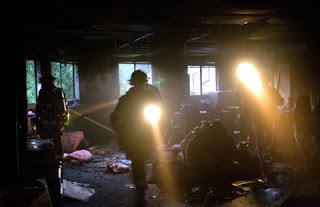 How do you write a scene? A chapter? A novel? Specifically, how important is imagination when you're writing? How important is the art of description when you write?
How do you write a scene? A chapter? A novel? Specifically, how important is imagination when you're writing? How important is the art of description when you write?I broach this subject because a friend of mine (Paul D. Brazil) posted on Facebook a recommendation for a Turner Hahn/Frank Morales book currently out called A Taste of Old Revenge (find it down in the column on the right). He said that the book is full of visual images that, if properly captured, would make for an exciting movie.
Wow.
In one brief sweep of keystrokes Paul perfectly described the way I write. Using words to paint an image. Literately.
I don't know about you but I'm not a happy troglodyte when it comes to today's genre fiction. It's too . . . fracken . . . bland. There's no color. No visceral involvement pulling the reader into the action. In essence, today's writing makes for sensory deprivation for the reader. The reader is standing off in the distance with a huge telescope watching the action from a safe distance. Removed from the bleeding, the sweat stinging one's eyes, the feel of cold steel in a gum man's hand, the smell of fresh blood oozing out of a bullet hole.
I don't want to write like that. I don't want a reader to be an observer. I want the reader down in the dirt. I want him rolling in the muck and feeling the pain. I want him to taste . . . literately taste . . . fear. I want him to know how it feels to really lose someone you love. Or the narcotic burst of raw emotion when you defeat a foe superior to you in every measure possible.
Writing like this requires the application of imagination and descriptive qualities measured in just the right proportions. Too little and you're just writing like the other cookie-cutter clones that have flooded the market. Too much imagination and description and you turn off the reader's imagination.
Not good, Tonto; not good at all. The reader's imagination is very important.
On the other hand . . .
I wonder . . . often . . . if perhaps the reader's imagination is overrated. I wonder if we overestimate the reader himself. Publishers and literary agents will tell you that too much description will kill a good read and turn off the reader. Essentially I agree with that. But on the other hand, a reader picks up a book to be entertained. He doesn't necessarily want to fill in the gaps mentally. He wants to see the action unfolding before him. He wants to hear the bombs exploding. A story aptly described puts the reader right in the middle of the fight. Little imagination is required.
You don't go to a James Bond movie and just see the figure of James Bond, alone, fighting an imaginary villain with the expectation that the movie goer must mentally fill in the empty screen with the necessary details to complete the picture. Each scene of a movie is painstakingly designed visually to create an effect.
What I am saying is a book should be composed the same way.
Each chapter of a novel I write is set up visually first; plot second. Quite possibly my writing could be described as me stringing a series of visual vignettes together that, taken as a whole, makes the novel complete.
To be honest one of the two reasons I became a writer is because I am not that happy troglodyte I mentioned earlier. I'm not happy with today's writing. So I decided to write stories I want to read. (the other reason I became a writer is simple; I like to tell stories)
But here's the rub. Am I a successful writer? Are my works as plentiful and well received as hundreds of writers are today.
No. By any standard of measurement I'm just another small fish in a very big body of briny water.
But this is the way I roll, baby. And I'm thinking the market is so large, so diverse, so complex, that my way of writing would find a sufficiently large enough audience to enjoy some measure of success.
Or not . . . Who the hell knows for certain.
Published on February 26, 2013 07:16
February 17, 2013
. . . Coming out Soon
 In anticipation of its arrival in the Amazon Kindle Store, I'm presenting to you volume three of the Call Me Smitty series.
In anticipation of its arrival in the Amazon Kindle Store, I'm presenting to you volume three of the Call Me Smitty series.Call Me Smitty: There are No Heroes.
Seven short stories featuring you know who . . . Smitty. A dark character with a rather severe strain of biblical justice embedded into his psyche. To say the man has a damaged sense of right and wrong might be going a bit too far.
But then again, maybe not.
In this particular genre there are a lot of tough guys out there. You can name them better than I can so I'm not even going to try. So me trying to parse together someone to insert into this overcrowded venue and expect him to hold his own has been, shall we say, a sizable chore to accomplish. In the end, that's for you to decide.
But I will say this. I've tried to make Smitty both colder yet, somehow, more trustworthy. You don't really want to upset Smitty. On the other hand, having a guy like this around when the real shit hits the fan would be a damn fine idea.
And I'm trying to expand the man's clientele. He's not just an assassin. Now, for the right price, he cleans up other peoples' messes. Or contracts out to super secret spy agencies no one knows about and hides their dirty laundry.
Seventy seven pages of bloody revenge, vicious double crosses, along with an assorted venue of blood and mayhem.
I like every story in here. But I admit I do have favorites. Yet I'm wondering if my choices are going to be yours as the two 'best.' I particularly like the very first story, called There Are No Heroes, and the very last story, called I'm Sure.
It should be popping up in the Kindle store shortly. And (confession time here) you'll note the original art work is not quite the same as the one here. A small correction had to be made and I'm trying to get the new cover up to replace the original.
And while we're at it, you might as well check out volumes one and two of the series. Especially volume one. You'll find out how Smitty became Smitty. (you can find those at the top of the right hand column)
Published on February 17, 2013 10:53
February 13, 2013
Writing a Novel
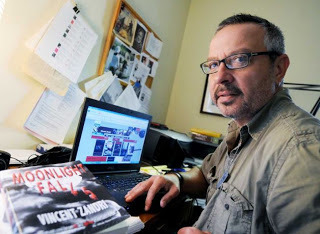 You know and I know Vincent Zandri. If you like reading noir/hard boiled steeped in the dark side of possibility, then you've read this guy.
You know and I know Vincent Zandri. If you like reading noir/hard boiled steeped in the dark side of possibility, then you've read this guy.He's that kind of writer who goes out and does a lot of research before he sits down to sling words around on a computer screen. Maybe its because of his gigs as a news reporter he worked, and still works occasionally works , which ingrained this first step into him. Who knows . . .
All I know is if you want to read one hell of a gripping novel, read one of his.
So it occurred to me . . . . . hmmm. How does this guy go about writing a book? And wouldn't it be kinda of freaky tapping into this resource and extracting the messy details out of him for all of us to see. So . . . what the hell. I asked if he'd be willing to step into the confessional and rip his guts out for us.
Surprise! He agreed! (and I owe him big time for that.)
So without further ado, let's get into the interview. You're gonna love it!
1. Okay, I'm ready to pick your brains, my friend. I want to know what makes you tick when it comes to writing a novel. So first question; how do you choose a story? Does a feeling come over you that makes you want to write? Or does a story/plot idea grab you by the collar of your shirt with both hands and slaps you around like some B-movie mobster first before you take notice?
It’s a strange process and one I’m not always in charge of. I’ve had situations where I’ve thought a book through for more than a year before I started writing it, like The Concrete Pearl for instance. I knew the ending to this book and the beginning, but I had no real way of knowing what was going to happen in between until I finally started on it. Even after thinking about for all that time, it was a tough one to write. Maybe because I was so close to the subject, which is corruption in the commercial construction industry, and having grown up in the family construction business, it might have been over researched.
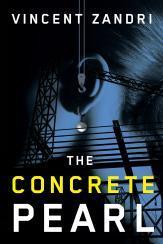 The Concrete Pearl
But then there are stories that flash into my brain and grab me instantly, like when I’m getting coffee at the local bodega for instance, and I set to work on them immediately without thinking about what’s going to happen. That’s a magical thing. If all goes well, before you know it, five or six weeks will have passed and I’ll have a full first draft of a novel. It’s entirely spontaneous and wonderful, like meeting a beautiful woman while taking a coffee as a small bar in Florence.
The Concrete Pearl
But then there are stories that flash into my brain and grab me instantly, like when I’m getting coffee at the local bodega for instance, and I set to work on them immediately without thinking about what’s going to happen. That’s a magical thing. If all goes well, before you know it, five or six weeks will have passed and I’ll have a full first draft of a novel. It’s entirely spontaneous and wonderful, like meeting a beautiful woman while taking a coffee as a small bar in Florence.
Moonlight Rises was that way. My wife and I had split up at the time and I was a little out of sorts because she was dating, as was I. In order to deal with this, I wondered what would happen if my character Dick Moonlight died suddenly, and she came to his side while he lie on his deathbed. I pictured the scene in my mind a hundred times over the course of one single cup of coffee: Moonlight lying on his back and his ex, Lola coming to say her final goodbyes. Only, while doing so, her new boyfriend comes into the picture. Moonlight, having just passed is watching all this from up above his body while he has his out-of-body experience. What happens? He gets so mad, he forces himself back into his body so he can kick said boyfriend’s ass…Moonlight Rises!!!
In the end, the stories choose us, not the other way around. I do however subscribe to the farmer policy, in that I switch crops now and again. If I’m just getting of a hard-boiled thriller like The Guilty, which I just completed or Murder by Moonlight, then I’m apt to try something in a different vein, like my new action adventure series CHASE.
2. Specifically, what are the key components in a story that must come together first before your convinced this story will work as a novel? Are your novels always based off stories from the outside world? Or does an idea slowly begin to build from within, piece by piece, until it reveals itself as a full fledged masterpiece?
I go both ways. Murder by Moonlight is very much based on the true story of Bethlehem, NY axe murderer, Chris Porco, and I knew I had no choice but to structure an intricate fiction around the existing non-fiction. This is a case where you research enough material to make you plenty hard, and then you stop and go about the business of literary copulation. It also keeps you guessing as a novelist and not bound by any fences or Stop signs. In my case, I was able to explore many scenarios and possibilities the cops could never explore in the real case. In the end, I’m not convinced the kid did it alone. I guess you could say that in some ways, “Murder” is my Norman Mailer, “New Journalism” novel.
Then there are novels that begin with a character I want to create. I don’t write notes. Like Capote, I allow the character to take up space in my brain for a while. If he or she sticks around long enough, I know I’m going to write a book for them, bring them to life if you will. My new CHASE series was created like that. For months I was walking around Italy thinking about a character names Chase Baker, who is both a novelist and an adventurer. He lives in New York and Florence, but he also travels the world, on occasion doing some tomb raiding as a sandhog, which was his original profession. The sandhogging makes him some good money but also provides the basis for some of the novels he writes. That in mind, I travelled to Egypt this past October and got plenty good material for the book. I wrote the first draft in five weeks.
3. Fitting characters to a story; how does that take shape? Do you pull characters out and expand upon them from a real crime story? Or do you build a character to fit a story?
Sometimes neither. Sometimes both. Obviously, Dick Moonlight is a carefully designed character who has a small piece of 22 cal. bullet in his brain which could kill him at any moment. Therefore all the Moonlight novels are written around this circumstance which can make for some fun plotting. Especially when he dies and must be resurrected yet again!! That’s why those novels are so fun to write and to read. You never know what’s going to happen and in a sense, anything can and will happen.
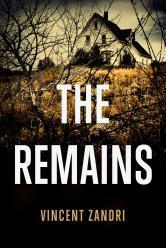 The Remains
In other instances, like my very popular stand-alone, The Remains, I wanted to write about identical twins who were abducted when they were pre-teens, which required some research into how twins function. That research helped develop the plot and in some ways determined the plot and overall story. It also features an autistic savant oil painter, so I had to be careful how I treated that character. Unlike the Moonlight books, anything can’t happen that wouldn’t happen in real life. You following me here?
The Remains
In other instances, like my very popular stand-alone, The Remains, I wanted to write about identical twins who were abducted when they were pre-teens, which required some research into how twins function. That research helped develop the plot and in some ways determined the plot and overall story. It also features an autistic savant oil painter, so I had to be careful how I treated that character. Unlike the Moonlight books, anything can’t happen that wouldn’t happen in real life. You following me here?
4. Continuing on with the character development angle; writers who write a continuing character . . . a series featuring one or more characters . . . does this limit a writer's imagination or enhances it? Why do you think many publishers prefer a writer developing a continuing character?
I don’t think it limits anything. If anything, you get to explore more of your character as he grows and changes and ages. Unlike the Spenser novels or even the Mike Hammers, I try and age my serial characters as the years fly by. I think if you make them real like that, have them experience what it’s like to turn 45 or 50, for instance, it makes for an more interesting novel. You can’t do what you did at 25 at 50 even if you’re in top shape, so that makes for interesting writing.
Publishers like serials because, if they’re good, you build more and more of an audience with each book published, which is happening with my Moonlight series, and also my Jack Marconi books. As a writer, however, I feel you can become almost too comfortable by concentrating too much on serial writing. Which is why I try and write a stand-alone every two or three books. Keeps you sharp as an artist and keeps life interesting.
5. Writing habits; when you're knee deep in writing on a project, do you carve out a block of time each day to write? Do you set deadlines on the amount of words that must be produced? Or do you use a when-the-mood-hits-me approach? Are there advantages/disadvantages to either approach? And most important of all, do you do a lot of research before you write? Or while you're writing?
I’m a disciplined writer. I write every day, two hours in the morning and two hours in the afternoon. I keep the schedule no matter what, even when I’m overseas. The most time I’ve ever taken off over the past twenty years is a week. As for the research, depending upon the project, I study what I have to in order to get started. Then I might do a little more as I go, strictly on a as needed basis. In general, I might outline the first few chapters, but I rely on the story to form organically as it goes. However, I also make sure to end in a place where I can be sure to carry on the next day. Papa Hemingway did the same thing way back when and it’s some of the best advice you can pass on to a young writer. Never shoot your entire load in a single sitting. By the way, one of my hugest fans is Ernest Hemingway’s great granddaughter, Mia Hemingway. I think there’s something very humbling about that.
6. Traditional publishing versus ebook publishing? How has this conflict changed, if any, the writing process? Should books, page number wise, be longer or shorter if writing for ebook publishers only? Should there be a different style in the writing between the two? Are there any differences between those who prefer reading traditionally compared to those who have gone electronic?
In the words of Jim Harrison who was recently asked more or less the same question, “Who gives a shit?” So long as I am writing the stories I want to write and people are reading them either on paper or on a screen or listening to them on audio, it really doesn’t matter because my job is always the same. I get up, make the coffee, sit down to a blank page.
7. Last question. How much success have you seen since you've gone the ebook route? What are you writing on now? Any news about possible movie options? Television series options? Don't be shy . . . tell us everything that is on your plate currently.
My success with ebooks is widely known, and for some reason I’m being written up by the likes Publishers Weekly and being interviewed by the New York Times as this huge indy and self-publishing success. But the fact of the matter is this: I’ve never self-published a novel in my life, and there are far great success stories out there than me. LJ Sellers, for example. I guess I’m lumped into the “hybrid author” category since ebook publishing is almost entirely based on the self-publishing model. That’s fine with me. I refer back to the previous question. Who gives a shit how it’s published or the business model under which you are contracted? The point is to write great books and to earn a readership who will follow you forever or longer.
There is indeed some movie play, yet again. Craven Films has been showing interest. Also Mel Gibson’s company, Icon. But I never hold my breath in these circumstances. I leave it all up to my agent Chip MacGregor. Right now I’m finishing my first CHASE novel. I’ve also just finished book three in the Marconi series, The Guilty. Thomas & Mercer is bringing out the fifth (or is it sixth?) Moonlight novel, Moonlight Sonata in the late Fall of ’13 or early Winter ’14. And did I just say I’ve never self-published. Well, I’m in the process of staring my own label, Bear Media, so that I can finally put out a couple of my own novels. I’m not sure how it’s going to go, and I suppose that in the end, if it doesn’t work out, I can go to a traditional publisher with the work. But for now I want to experiment a little with being both author and publisher of at least a small selection of my own work. It should prove to be an adventure at the very least. And I think that’s what life should be all about. The adventure.
Thanks for having me, BR.
Published on February 13, 2013 10:23
February 7, 2013
Interviewing John Lehman
 There's an ezing out there called Lit Noir. A hard hitting mag that takes on the old ramshackle house for a genre called Noir and tries to give it a fresh coat a paint, a different kind of look; revitalizing the old place by looking for fresh talent. Talent as in writers who have a clear vision what a good noir tale should be. Which I am happy to admit I will be one of writers showcased in volume #9 coming out shortly. 'Smitty' makes his debue in Lit Noir with a nasty little ditty called I'm Sure. I'm sure those who know my dark eyed hit man will be pleased with it. More importantly I have high hopes that a number of new fans will come knocking on Smitty's door once they discover him. The mag is an audacious attempt from an audacious writer with tons of experience to redefine what noir is. I've always thought genre literature . . . and it certainly is literature to me . . . fundamentally is more compelling because, unlike traditional literature, genre goes to the deepest recesses of the soul to find its stories. Passion, hatred, lust, loyalty; all painted with a more interesting brush. Yet because these stories come out in 'pulp' magazines, and there are far more writers working in this field than there are in the traditionalist venues, somehow genre writing is tagged as an inferior product. Hmmmm . . . don't think so, Ernest. Anyway . . . the man behind Lit Noir is a guy by the name of John Lehman. A poet, a writer, an editor, John has been around for a long, long time. He has a wide selection on the market of his works, of which quite a bit revoles (and here I am only guessing) his first love; poetry. But what makes him unique in my eyes is that he has a very similar respect and definition for genre as I have. Always good, muchachos, to find a writer who shares your same viewpoint. I was invited to share one of my stories to Lit Noir. Now I've asked John to share some ideas with me about creating the mag, about writing in general, etc. I think you'll find the interview interesting. So enjoy.
1. Everyone, if they are a writer, knows how hard it is to write. But they can only imagine how difficult it would be to become a writer/editor/publisher of an magazine. So tell us, what in Hades got into your head to start Lit Noir? Where did the seed of starting this creation first pop unto existence?
It started with publishing Rosebud Magazine(a literary magazine going on twenty years). I had been doing writing workshops and had lists of people who I thought might make good readers. Also I had a friend who was willing to help (Rod has since taken over as publisher). Print publishing can be expensive (I had moved into books after a few years) and that’s what led me to look at the digital angle for both publishing and launching Lit Noir. I think this has become an exciting time for writers thanks to the old system breaking down and digital being so accessible. But the time to act is now. Five years from today big corporations will have figured out how to monopolize it. No matter, I have learned that you have to do what you love because the monetary reward may not follow. I have always liked film noir and writers like Shirley Jackson and Patricia Highsmith who indulge our shadowy side. My friend came up with the term “Lit Noir” and I was in business.
2. How successful has Lit Noir become so far? Is it growing? Is the reading population world wide? Have you been overwhelmed with writers knocking on your door asking to come in?
Kindle Publishing lets you offer your book or magazine free for five days. So I sell it for a buck a copy on Amazon, but also give it away in order to build audiences. The total amount may be around 400 or 500 per issue out. Whatever money there results, goes to the cover artist and funding t-shirts. But my main objective is to get readers for writers. I also host a LitNoir.com web site that showcases samples from the magazine and announces the give-away dates. There’s a lot of good stuff on the Internet, but I want to provide a vehicle with particular focus, so that connections will be made and start to build. I was surprised (and very pleaded) to find that there are strong communities of noir writers and readers throughout the world.
3. The dark, the macabre, the noir-infested story of mayhem and revenge. Which one is your particular fancy? Are you more into horror and the macabre than, say, hard boiled/noir?
I went into this a bit in Lit Noir #7. The stereotypes of film noir get tiresome, but boundaries between genres are always fuzzy. Conceptually, noir has much in common with certain kinds of fantasy. Recently I watched a documentary on the movie producer Val Lewton. Remember Cat People? Being trapped in an indoor pool at night? Shadows flickering on the walls? Suddenly there’s the growl of a leopard. And then nothing. Except in that moment our deepest fears fly out. But there is something more going on. One of the characteristics of noir is that it allows our unconscious to surface. And with that there is the promise of catharsis.
4. As editor, what do you look for in a story. What 'clicks' for you? Is it character development? The plot? Word choice/writing style? Two different writers create basically the same story. One works. One doesn't. Why?
I’m looking for something that hooks my attention, develops its underlying theme, brings it to a climax (with metaphoric implications) and leaves me with something to think about, apply to my own life. Editors are glorified readers, as anxious to find something that takes them further in and further out as anyone picking up the piece. That’s why we go to so many plays despite being disappointed in the past, read so many novels even though we have been left unsatisfied by most of them.
There's an ezing out there called Lit Noir. A hard hitting mag that takes on the old ramshackle house for a genre called Noir and tries to give it a fresh coat a paint, a different kind of look; revitalizing the old place by looking for fresh talent. Talent as in writers who have a clear vision what a good noir tale should be. Which I am happy to admit I will be one of writers showcased in volume #9 coming out shortly. 'Smitty' makes his debue in Lit Noir with a nasty little ditty called I'm Sure. I'm sure those who know my dark eyed hit man will be pleased with it. More importantly I have high hopes that a number of new fans will come knocking on Smitty's door once they discover him. The mag is an audacious attempt from an audacious writer with tons of experience to redefine what noir is. I've always thought genre literature . . . and it certainly is literature to me . . . fundamentally is more compelling because, unlike traditional literature, genre goes to the deepest recesses of the soul to find its stories. Passion, hatred, lust, loyalty; all painted with a more interesting brush. Yet because these stories come out in 'pulp' magazines, and there are far more writers working in this field than there are in the traditionalist venues, somehow genre writing is tagged as an inferior product. Hmmmm . . . don't think so, Ernest. Anyway . . . the man behind Lit Noir is a guy by the name of John Lehman. A poet, a writer, an editor, John has been around for a long, long time. He has a wide selection on the market of his works, of which quite a bit revoles (and here I am only guessing) his first love; poetry. But what makes him unique in my eyes is that he has a very similar respect and definition for genre as I have. Always good, muchachos, to find a writer who shares your same viewpoint. I was invited to share one of my stories to Lit Noir. Now I've asked John to share some ideas with me about creating the mag, about writing in general, etc. I think you'll find the interview interesting. So enjoy.
1. Everyone, if they are a writer, knows how hard it is to write. But they can only imagine how difficult it would be to become a writer/editor/publisher of an magazine. So tell us, what in Hades got into your head to start Lit Noir? Where did the seed of starting this creation first pop unto existence?
It started with publishing Rosebud Magazine(a literary magazine going on twenty years). I had been doing writing workshops and had lists of people who I thought might make good readers. Also I had a friend who was willing to help (Rod has since taken over as publisher). Print publishing can be expensive (I had moved into books after a few years) and that’s what led me to look at the digital angle for both publishing and launching Lit Noir. I think this has become an exciting time for writers thanks to the old system breaking down and digital being so accessible. But the time to act is now. Five years from today big corporations will have figured out how to monopolize it. No matter, I have learned that you have to do what you love because the monetary reward may not follow. I have always liked film noir and writers like Shirley Jackson and Patricia Highsmith who indulge our shadowy side. My friend came up with the term “Lit Noir” and I was in business.
2. How successful has Lit Noir become so far? Is it growing? Is the reading population world wide? Have you been overwhelmed with writers knocking on your door asking to come in?
Kindle Publishing lets you offer your book or magazine free for five days. So I sell it for a buck a copy on Amazon, but also give it away in order to build audiences. The total amount may be around 400 or 500 per issue out. Whatever money there results, goes to the cover artist and funding t-shirts. But my main objective is to get readers for writers. I also host a LitNoir.com web site that showcases samples from the magazine and announces the give-away dates. There’s a lot of good stuff on the Internet, but I want to provide a vehicle with particular focus, so that connections will be made and start to build. I was surprised (and very pleaded) to find that there are strong communities of noir writers and readers throughout the world.
3. The dark, the macabre, the noir-infested story of mayhem and revenge. Which one is your particular fancy? Are you more into horror and the macabre than, say, hard boiled/noir?
I went into this a bit in Lit Noir #7. The stereotypes of film noir get tiresome, but boundaries between genres are always fuzzy. Conceptually, noir has much in common with certain kinds of fantasy. Recently I watched a documentary on the movie producer Val Lewton. Remember Cat People? Being trapped in an indoor pool at night? Shadows flickering on the walls? Suddenly there’s the growl of a leopard. And then nothing. Except in that moment our deepest fears fly out. But there is something more going on. One of the characteristics of noir is that it allows our unconscious to surface. And with that there is the promise of catharsis.
4. As editor, what do you look for in a story. What 'clicks' for you? Is it character development? The plot? Word choice/writing style? Two different writers create basically the same story. One works. One doesn't. Why?
I’m looking for something that hooks my attention, develops its underlying theme, brings it to a climax (with metaphoric implications) and leaves me with something to think about, apply to my own life. Editors are glorified readers, as anxious to find something that takes them further in and further out as anyone picking up the piece. That’s why we go to so many plays despite being disappointed in the past, read so many novels even though we have been left unsatisfied by most of them.
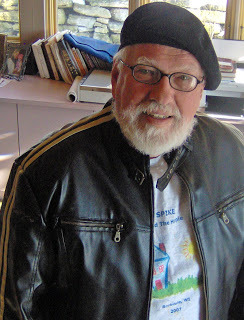 5. Give us your prognosis on the health of genre fiction today. Is it healthy and growing? Is it slowly dying off? Or is it somehow changing into something else?
I think this is a very exciting time for writers and readers. E-books, blogs, special apps, digital magazines...are giving us access to each other in a way science-fiction writers fifty years ago could only imagine. I have 25 books on Kindle, mostly under “Jack Lehman.” All are five bucks or less and you don’t even need a Kindle, they will provide a free app at the site for computers, iPads, etc. I say this, not to brag, but to encourage what anyone can do instead of waiting 25 years to interest a traditional publisher (reducing his or her work to their tired formulas).
6. Who do you see coming up through the ranks that might soon burst open and become the next mega star. Care to make any predictions?
As I’ve implied in my answer to the question above, we don’t need megastars anymore. There are fresh new voices, with fresh new ways of saying things, to readers who want “now.”
7. In relation to the above question, in your opinion, what does it take for a writer to succeed? Talent or determination? Or just plain Luck?
Talent, luck, determination are all important, but you need to aggressively reach out to readers in a way that speaks to them. And if you don’t know how, the answer is: learn. Marketing. It means more than selling books, it involves understanding and appreciating your readers in a way that is beneficial to them.
8. What's next for Lit Noir? Is it branching out into a more extensive publishing format? Get serious, perhaps, in e-publishing novels? What does the future hold?
We are doing single issues and bundling each four into Kindle anthologies. Reaching out to people we think might benefit from being under our umbrella. I am in rural Wisconsin and getting pieces and ideas from Poland, Russia, Switzerland and elsewhere in the U.S. This is exciting. And so unexpected, I can’t even imagine where it will lead. But where ever it does, I am ready to follow. I strongly urge you to go out and find John's works. There's a wide variety to choose from. And I urge you to check out Lit Noir (uh . . . especially # 9). Writers from all over the world are creating a mag of astonishing qualities. You won't be disappointed.
5. Give us your prognosis on the health of genre fiction today. Is it healthy and growing? Is it slowly dying off? Or is it somehow changing into something else?
I think this is a very exciting time for writers and readers. E-books, blogs, special apps, digital magazines...are giving us access to each other in a way science-fiction writers fifty years ago could only imagine. I have 25 books on Kindle, mostly under “Jack Lehman.” All are five bucks or less and you don’t even need a Kindle, they will provide a free app at the site for computers, iPads, etc. I say this, not to brag, but to encourage what anyone can do instead of waiting 25 years to interest a traditional publisher (reducing his or her work to their tired formulas).
6. Who do you see coming up through the ranks that might soon burst open and become the next mega star. Care to make any predictions?
As I’ve implied in my answer to the question above, we don’t need megastars anymore. There are fresh new voices, with fresh new ways of saying things, to readers who want “now.”
7. In relation to the above question, in your opinion, what does it take for a writer to succeed? Talent or determination? Or just plain Luck?
Talent, luck, determination are all important, but you need to aggressively reach out to readers in a way that speaks to them. And if you don’t know how, the answer is: learn. Marketing. It means more than selling books, it involves understanding and appreciating your readers in a way that is beneficial to them.
8. What's next for Lit Noir? Is it branching out into a more extensive publishing format? Get serious, perhaps, in e-publishing novels? What does the future hold?
We are doing single issues and bundling each four into Kindle anthologies. Reaching out to people we think might benefit from being under our umbrella. I am in rural Wisconsin and getting pieces and ideas from Poland, Russia, Switzerland and elsewhere in the U.S. This is exciting. And so unexpected, I can’t even imagine where it will lead. But where ever it does, I am ready to follow. I strongly urge you to go out and find John's works. There's a wide variety to choose from. And I urge you to check out Lit Noir (uh . . . especially # 9). Writers from all over the world are creating a mag of astonishing qualities. You won't be disappointed.
Published on February 07, 2013 12:17
January 30, 2013
The writer's touch
 William Powell and Myrna Loy. In 1934 they were Nick and Nora Charles, husband and wife, in a movie called The Thin Man.
William Powell and Myrna Loy. In 1934 they were Nick and Nora Charles, husband and wife, in a movie called The Thin Man.Based on a novel written by Dashiell Hammett published in 1934, MGM picked up the movie rights and began immediately to produce the movie. For MGM it turned out to be one of the soundest investment franchises it ever made.
Powell and Loy were made for each to for the big silver screen. The moment the first scene lights up you instantly see the chemistry between the two. Spontaneous, genuine, with a lot of bantering humor thrown in, The Thin Man became an instant success. It established the two as being the pioneers in a kind of romantic mystery series which, frankly, both still holds up today as being the best of the lot . . . and rarely seen anymore, much less rivaled, in today's cinematic excursions.
If you haven't seen The Thin Man series you're missing something special. Especially the first three or four in the series. They are the best. And there is a reason for it.
Dashiell Hammett.
Goodness, Hammett was a character. An alcoholic who loved to party from dusk to dawn. A womanizer of the first magnitude. A social maven who could schmooze with the best. Yet gracious when drunk . . . most of the time. Perfectly charming and hard working when sober. It was just getting him sober which became every one's problem.
But when off the booze, Jesus, this guy could write! Read the novel and you can see it instantly. Remarkably the novel was translated into movie format and carried with it the essence, the dialogue, the feel of the novel. So successful was the first one MGM's moguls quickly tracked down Hammett and signed him to a contract to write the treatments for two more movies.
Hammett did not write the scripts. He wrote 'treatements' for the movies. Essentially, novellas entitled After The Thin Man and Another Thin Man. From these treatments script writers came in and carried the novellas over into the movies. Almost word for word. So good in fact was Hammett's writing that, after he left the franchise, other writers were brought in and NEVER caught the wit, the humor, the wise-cracking banter that was the signature of a Hammett creation.
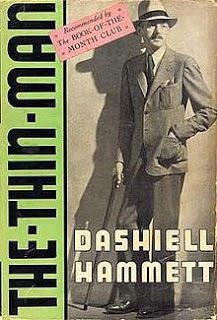 The original dust jacketSo that's what I'm trying to get at here. The importance of the writer and his creations. Find a writer who can weave mystery and humor together, and do it in such a way as it comes out so natural, so smooth . . . well then, brother; you've got something! Hammett did it so well no one, in my opinion, has equaled him.
The original dust jacketSo that's what I'm trying to get at here. The importance of the writer and his creations. Find a writer who can weave mystery and humor together, and do it in such a way as it comes out so natural, so smooth . . . well then, brother; you've got something! Hammett did it so well no one, in my opinion, has equaled him.(That last line . . . does it sound like a challenge to you? It does to me. Hmmm . . . )
More should be said about Hammett's ability to use humor in a detective novel. A rarity in the genre. And always refreshing to the reader if set down properly. But that's for another time, pilgrim.
For now, run off and get you a copy of the novel. And then find a DVD of the movie. You'll find yourself well entertained in both venues.
Published on January 30, 2013 09:57



